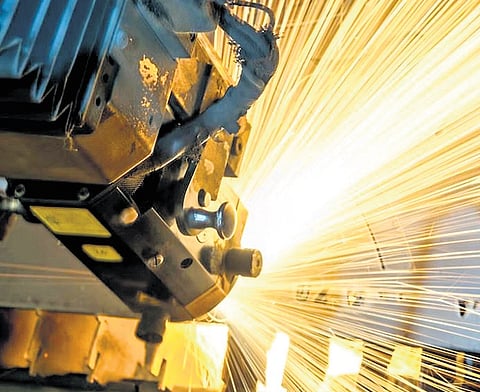

NEW DELHI: The HSBC India Manufacturing Purchasing Manager’s Index (PMI) touched a 16-year high of 59.1 in March from 56.9 in February on the back of the strongest increases in output and new orders since October 2020.
The HSBC India Manufacturing PMI, which is compiled by S&P Global from responses to questionnaires sent to purchasing managers in a panel of around 400 manufacturers, showed employment returned to positive territory and firms scaled up buying levels.
According to a press release issued by S&P Global, growth of new orders accelerated to the quickest in nearly three-and-a-half years during March, amid buoyant demand conditions.
“Inflows of new work strengthened from both domestic and export markets, the latter reportedly reflecting better sales to Africa, Asia, Europe and the US. New export orders increased at the fastest pace since May 2022,” says the report. Manufacturing output rose for the thirty-third month in a row in March, and to the greatest extent since October 2020. Growth also picked up across the consumer, intermediate and investment goods sectors. The steepest expansion in production was seen at investment goods makers.
On jobs, the survey says that Indian manufacturers hired additional workers in March after a lull period in the first two months of the year.
“The pace of job creation was mild, but the best since September 2023. Anecdotal evidence highlighted the recruitment of mid-level and fulltime employees,” says the S&P Global. According to the PMI survey, despite remaining modest by historical standards, cost pressures were at their highest in five months. Manufacturers had to pay more for cotton, iron, machinery tools, plastics and steel.
The Purchasing Managers’ Index is a survey-based indicator such as business output, new orders, employment, costs, selling prices, exports, purchasing activity, supplier performance, backlogs of orders and inventories of both inputs and finished goods, where applicable.